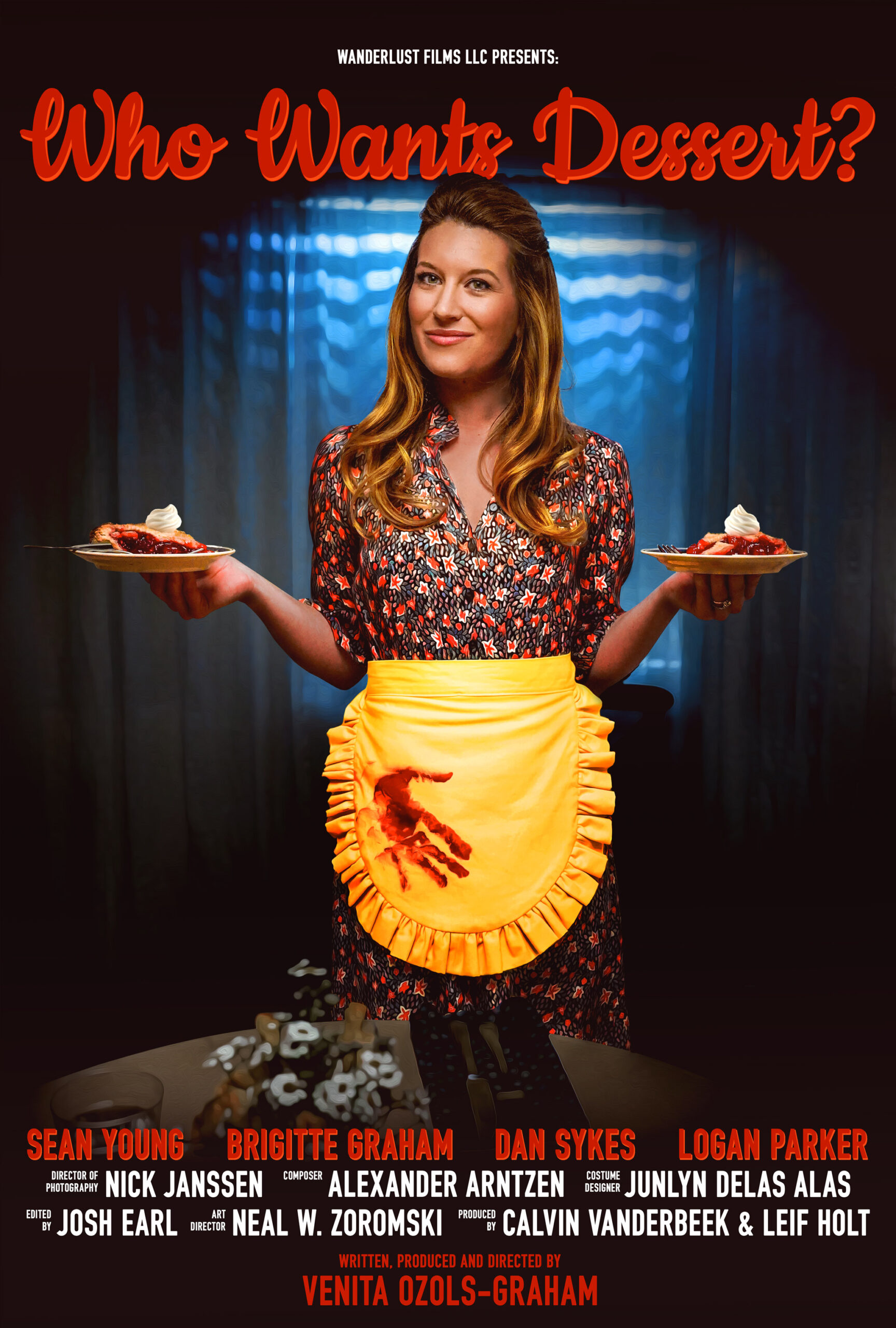ARFF barks again
But the venue is a dog
 Exclusive to MeierMovies, March 13, 2022
Exclusive to MeierMovies, March 13, 2022
At the risk of gross oversimplification, I contend there are two types of film festivals: those designed almost exclusively for filmmakers and those meant for both filmmakers and the public.
The Austin Revolution Film Festival (ARFF), which returned to the Texas capital February 15-19 (after a COVID cancellation last year), is the former. But that’s not an insult, as the festival has found its niche, becoming a popular event for low-budget (and no-budget) independent filmmakers, especially those who have found difficulty getting into other fests. Indeed, one filmmaker I spoke to at this year’s event said ARFF was the only fest that had accepted his movie.
That’s both good and bad. It’s positive for the obvious reason: Filmmakers who have previously gone unrecognized get to share their work, facilitating feedback and the chance for growth. Conversely, a festival needs standards. Letting in too many films can foster the “everyone deserves a medal” culture, making festival acceptance meaningless. Lower standards can also make it more difficult to attract the public, especially in a city like Austin, which has numerous higher-profile fests, not to mention several Alamo Drafthouses. Nevertheless, most participants and festival director James Christopher seem relatively satisfied with ARFF, with Christopher pointing out that the acceptance rate is relatively low considering the event received 3,000 submissions in 2020 and 2,200 in 2022.
“Our festival is dedicated to blue-collar filmmakers,” Christopher said in his Screen Jocks podcast on March 2, adding that ARFF doesn’t shy away from “gritty” films. And while Christopher said he recognized the value of drawing the public, he admitted that the fest wasn’t really designed to draw people off the street. Indeed, he said he was worried about “overselling the space” if ARFF’s attendance increased dramatically, though, admittedly, that’s a bit of a reach considering many screenings – especially on Tuesday, Wednesday and Thursday – were mostly empty. A couple of Friday and Saturday screenings in addition to Saturday’s massive awards ceremony were the only parts of this year’s event that approached capacity. (I still don’t know how they engineered the room renovations in time for the awards. That was the most impressive technical achievement of the entire event.)
Ultimately, it might be nice if the festival could attract the type of community support enjoyed by another filmmaker-friendly festival held at a similar time as ARFF each year: the Love Your Shorts Film Festival in Sanford, Florida. But that’s a tough task and, admittedly, easier for a small town such as Sanford than the megalopolis that is Austin, especially when the latter city is already dominated by the South by Southwest Film Festival.
When it came to screening quality, Christopher said, “Everything was so well oiled that I was able to actually hang out with filmmakers.”
Well, sort of. Though ARFF probably had the best projection and sound of any fest I’ve attended at a hotel, it’s still a fest in a hotel. In other words, there were issues. For instance, sound tended to be a bit tinny in the largest room, though that’s more the fault of the acoustics than anything the fest did.
Unfortunately, the two smaller rooms also weren’t without problems. For example, at least one block of short films was projected incorrectly, with the picture zoomed in, meaning some of the image on all four sides was cut off. (When I told Christopher, he corrected it immediately.) Frame-rate glitching (a jerky image usually caused by problems converting 30 frames per second to 24) was also common, as it is as many smaller festivals. (It’s often difficult to prevent unless a festival requires DCPs.) But most attendees didn’t seem bothered, and the general mood in the large and conveniently located bar following and proceeding screenings was jovial and appreciative.
Christopher and other staff members seem open to improvements, including tweaking the Q&A sessions. This year many took place in a small room just off the hotel restaurant, instead of in the screening rooms, which resulted in low attendance and lack of continuity. That will change next year, as ARFF plans to schedule enough time during the screening blocks to allow for a Q&A in the screening room immediately following the presentation of the films.
The films
 The fest screened nearly 300 films: about 20 features and the rest shorts. By Christopher’s own admission, that is massive, but it’s understandable considering this year’s event combined two years (the ninth and 10th annual festivals), owing to past pandemic cancellations. Next year’s fest, which is scheduled for February 8-11, according to Film Freeway, should and will be smaller, utilizing two screens instead of three.
The fest screened nearly 300 films: about 20 features and the rest shorts. By Christopher’s own admission, that is massive, but it’s understandable considering this year’s event combined two years (the ninth and 10th annual festivals), owing to past pandemic cancellations. Next year’s fest, which is scheduled for February 8-11, according to Film Freeway, should and will be smaller, utilizing two screens instead of three.
I saw about 50 films, and several deserve praise. Venita Ozols-Graham’s deliciously dark Who Wants Dessert? (starring Sean Young and Brigitte Graham), Mike Peebler’s slapstick single-taker For Closure and Christopher Piazza’s magically realistic romantic comedy Still Together are at the top of the list, while John Gray’s Exit Package, Craig Mooneyham and Jacob Reynolds’ Salting the Fly, Neil Holland’s The Dump, Robyn Paris’s Fruitless and Couple of Guys (a series pilot by Debra Markowitz) also merit recognition.
Couple of Guys stars festival favorite Lukas Hassel, who also appeared in two other projects at this year’s fest. In addition, he received the Director’s Choice award for best actor.
“ARFF is one of those rare festivals where most filmmakers who submitted a film actually attend as well, making for an amazing opportunity to network with fellow artists and truly be a part of the indie filmmaking community,” Hassel said.
Paris would seem to agree, saying, “The Austin Revolution Film Festival is a down-to-earth festival that fosters a supportive vibe amongst filmmakers and stands out as one of the friendliest and most upbeat festivals I’ve attended. And it’s in Austin, which is such a great town. I’m so glad I screened my film Fruitless there and would submit again in a heartbeat.”
Speaking of that supporting vibe, the festival does offer filmmakers plenty of networking opportunities, but it also makes it slightly more difficult because it doesn’t list the filmmakers’ names in its program or on its website. This also makes it harder to find the films on IMDB. And if I, as a critic and journalist, can’t confirm that information, I can’t add the films to my movie lists. So I would respectfully request that ARFF (and all fests) include the director’s name (and other information, such as writer, producer and runtime) in their programs and on their websites. Nevertheless, most of the ARFF films I saw have made my lists, which you can find here.
The hotel
I don’t wish to turn this film article into a travelogue, but the elephant in the room (or, more specifically, the skunk in the hotel) must be addressed. Christopher himself mentioned it at the awards ceremony: “This has not been a great experience from a venue perspective. We’re aware of that.”
Simply put, the Radisson Austin North should be closed, renovated, sold or all of the above. The hotel experience was a disaster for almost everyone attending the festival. For the first two days of the fest (and apparently at least a day before that), there was no hot water. This also meant no food service. Though they did hand out a “breakfast burrito” to gullible patrons one morning, I believe it was actually meant for dogs, which is carrying the “ARFF” theme a step too far.
The front desk didn’t seem to care and continually provided wrong information about the problem and incorrect estimates on when the issue would be fixed. And even when the hot water was restored, the restaurant never resumed full food service, opting instead to serve just four food choices in the bar during the evenings. All of those choices had meat, so non-meat-eaters had to eat off property. And on the first morning they resumed breakfast, almost all the food was gone well in advance of the advertised end time.
There were numerous other problems. The light burned out in my bathroom; the TV remote and clock didn’t work properly; the doors to my chest of drawers had been ripped off, leaving just hinges; hotel keys didn’t work properly in the elevators; and several guests reported insects in their rooms.
In the outdoor pool area, the Jacuzzi appeared to be open. But upon closer inspection, it was full of dirty water. When I asked if it was functional, an employee said it hadn’t worked since the beginning of the pandemic. Yet no sign told people it was closed, and the dirty water likely posed a health hazard.
 Perhaps the biggest problem, other than the lack of hot water, was that the lobby doors were under construction. For most of the fest, the doors were gone, allowing the 40-degree air to permeate the first floor of the building. The hotel apparently made no attempt to cover the opening with plastic or turn on the heat, so people had to walk around in coats and eat breakfast dressed for winter. And the construction noise meant you couldn’t comfortably hold a conversation in the lobby.
Perhaps the biggest problem, other than the lack of hot water, was that the lobby doors were under construction. For most of the fest, the doors were gone, allowing the 40-degree air to permeate the first floor of the building. The hotel apparently made no attempt to cover the opening with plastic or turn on the heat, so people had to walk around in coats and eat breakfast dressed for winter. And the construction noise meant you couldn’t comfortably hold a conversation in the lobby.
The hotel staff did finally agree to refund two nights of our stay (the nights with no hot water), but they were unable to provide printed receipts. They said their system was down and they would e-mail them. That’s fine, but, more than three weeks later, I have received neither that e-mail nor a response to my online feedback.
Festival attendees were reluctant to blame festival organizers for the hotel’s failings. Indeed, Christopher and others were apologetic and seemed just as appalled at the poor service. But the hard truth is that ARFF is not blameless. Though the hotel was apparently much nicer in previous years, a festival still has a responsibility to ensure a high-quality venue every year. The good news is Christopher told the ARFF crowd he would be exploring new locations for next year. And he has since confirmed it, telling me, “Yes, we’re changing venues.”
This positive step, in addition to the other improvements Christopher has mentioned, should guarantee a bright future for ARFF, as long as you don’t mind some “gritty” movies sprinkled among the polished products.
© 2022 MeierMovies, LLC
For more information, visit AustinRevolution.com.
